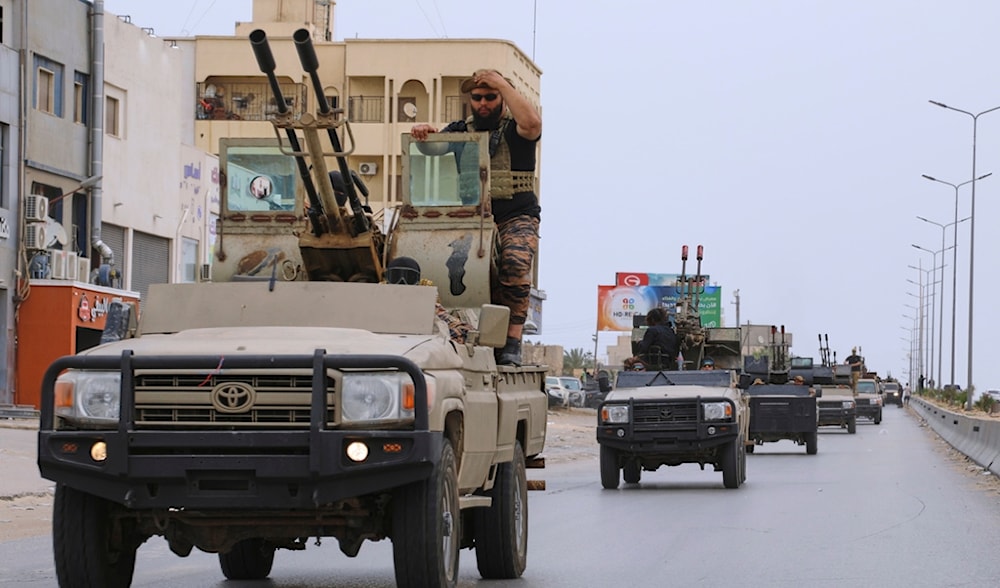Protesters demand resignation of Libya PM amid political turmoil
Hundreds protest in Tripoli demanding Prime Minister Abdul Hamid Dbeibeh’s resignation amid political unrest, ministerial resignations, and deadly clashes in Libya.
-

Libyan armored vehicles patrol after clashes between heavily armed militias in Tripoli, Libya, Wednesday, May 14, 2025.(AP)
For the second consecutive day, hundreds of demonstrators took to the streets of Tripoli, demanding the resignation of Libyan Prime Minister Abdul Hamid Dbeibeh, amid a worsening political crisis and the aftermath of deadly armed clashes.
Saturday’s protest, involving approximately 500 people, followed larger demonstrations on Friday at Martyrs’ Square, where thousands gathered before marching toward the prime minister’s office. The Tripoli demonstrations reflect growing public discontent following recent violence that left at least eight people dead, according to the United Nations.
Tensions rise after clashes, resignations
The Libyan political crisis intensified after armed groups engaged in deadly confrontations earlier in the week. Despite a return to partial normalcy, flights resumed, shops reopened, and workers returned, Tripoli remains on edge.
The government reported that a police officer was killed by unknown assailants while guarding Dbeibah’s office during the protests. Meanwhile, local media revealed that six ministers and deputy ministers from Dbeibah’s cabinet had submitted resignations, though only two have confirmed their departure publicly.
Municipal and political figures signal shift
Several municipal councils in western Tripoli declared their support for the protestors’ demands. Khaled al-Mishri, head of the High Council of State, announced he had begun discussions with the eastern-based parliament to select a national figure to form a new government, indicating potential cross-regional cooperation.
Libya remains divided between two rival administrations: the UN-recognized government in Tripoli led by Dbeibah, and a parallel authority based in the east, dominated by the family of military commander Khalifa Haftar.
Dbeibah seeks tribal support
In his first public appearance since Monday’s violence, Dbeibah met with tribal elders in Tripoli and called for unified efforts to prevent a return to "chaos and the rule of armed groups." He also held talks with a delegation from Misrata, his hometown, located roughly 200 kilometers east of Tripoli.
The government issued a statement saying the Misrata delegation “expressed firm and unwavering support” for Dbeibah’s efforts to restore state authority and reduce the influence of armed factions.
Turkiye repatriates citizens as uncertainty persists
Amid the uncertainty, Turkiye, a key backer of Dbeibeh’s administration, repatriated 82 Turkish nationals late Friday as a precautionary measure.
As calls for Abdulhamid Dbeibeh’s resignation grow louder, the political future of Libya remains uncertain, with widespread concerns that the current instability could once again spiral into open conflict.
Read more: Tunisian Foreign Ministry voices concern over violence in Tripoli

 3 Min Read
3 Min Read








